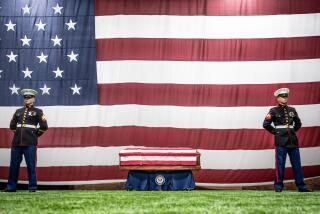Southland Soldier ‘Willing to Pay the Price’
- Share via
Brian Cody Prosser told friends that when his time came, he wanted to die serving his country.
On Wednesday, in a remote corner of southern Afghanistan, Prosser, an elite Special Forces soldier from Frazier Park, Calif., was killed when a bomb missed its Taliban target and landed about 100 yards from U.S. forces.
“He mentioned that this was the way he wanted to die . . . in the line of duty,” said Genafyr Tracy, who had known Prosser since childhood.
Prosser, 28, was one of three Army Special Forces soldiers killed by “friendly fire.” Five anti-Taliban Afghan fighters were also killed in the accident, and 20 U.S. soldiers and 20 Afghans were wounded.
The other Special Forces soldiers who died were identified as Master Sgt. Jefferson Donald Davis, 39, of Watauga, Tenn.; and Sgt. 1st Class Daniel Henry Petithory, 32, of Cheshire, Mass.
All were members of the Army’s 3rd Battalion, 5th Special Forces Group, stationed at Ft. Campbell, Ky.
Prosser, a staff sergeant, is survived by his wife, Shawna, his parents and three brothers, Jarudd, Mike and Reed.
Prosser was a 10-year Army veteran. He enlisted shortly after his 1991 graduation from Maricopa High School, where he had been football team captain.
Reached at his Frazier Park home, the soldier’s father spoke briefly about his son.
“He was a warrior and he was doing what he wanted to do,” said Brian D. Prosser. “He was a brave man and he was willing to pay the price. I can’t talk anymore. You understand.”
The younger Prosser, who was tall and wiry, decided to emulate his father, who once served in an Army Airborne unit. So he enlisted.
Brian Prosser, who owned a blacksmith shop, often worked side by side with his son, whom many in town called Cody.
“Cody really enjoyed working at that shop,” said neighbor Charlie Watkins, 79. “Cody’s dad loved that boy. I know he was the proudest father in the world when Cody made Airborne.”
A Maricopa High School football coach kept repeating one word when he recalled Cody Prosser: “tough.”
“Almost every other game he would separate his shoulder,” said Albert Allen, who was defensive coach when Prosser played linebacker for the San Joaquin Valley team. “And then he would go over to the sidelines and his dad--he was an assistant coach--would put his son’s shoulder back in place. Cody would just kind of grunt and that would be it. The whole family was tough. . . . Cody was just a fierce competitor.”
Tracy, 28, who owns Tracy’s video in Frazier Park, said she spent long hours on the school bus with Prosser.
Tracy described him as a down-to-earth and dedicated man.
“In this town you either become something or you don’t, because there’s not a lot in between,” Tracy said. “He became something and we are very proud of him.”
Frazier Park, population 2,300, is a tiny mountain town off Interstate 5 on the Grapevine. At Ed’s Tavern, a bar in the center of town, there was a lot of crying when the TV news revealed that among the soldiers killed was one of their own.
Minutes later, Steve LeGrasse, 28, who had grown up with Prosser, walked into the bar.
“Everyone turned and looked at me like something was wrong,” said LeGrasse, who had known Prosser since the sixth grade. “They told me Cody was dead, and I knew it was true. I went to the jukebox and played ‘Civil War’ by Guns N’ Roses. And I cried.”
Davis, one of the three Special Forces soldiers who was killed, was described as “quiet and kind of reserved” by Glenda Wilson, who attended Elizabethton High School in Elizabethton, Tenn., with him. He played football but seemed more drawn to solitary reflection. He spent a lot of time at a nearby lake, she recalled, practicing photography, a favorite hobby.
A woman who answered the phone at the Petithory residence Wednesday night said family members were not up to talking about their loss.
“Everyone’s pretty devastated at this point,” she said.
*
Times staff writers David Pierson, Miles Corwin and Richard Fausset contributed to this report.
More to Read
Sign up for Essential California
The most important California stories and recommendations in your inbox every morning.
You may occasionally receive promotional content from the Los Angeles Times.










